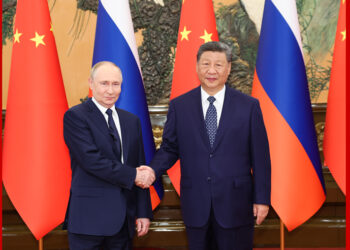Eighty years later, their actions continue to make an impression. They are present in history manuals, but above all engraved in the collective memory.
The front page of August 15, 1945 of the Ta Kung Pao newspaper on the unconditional capitulation of Japan, displayed at the Zhongshan Park in Wuhan (Hubei), July 31, 2025
The year 2025 marks the 80th anniversary of the victory of the Chinese people’s war of resistance against Japanese assault and the anti -fascist world war. These historical conflicts have deeply marked the fate of nations, but they also revealed the luminous humanity of countless individuals in front of the extreme. At the heart of the worst atrocities, acts of courage and solidarity were able to cross borders and go beyond all differences. These stories offer an unprecedented reading grid of war and vital lessons for our time.
Borderless actions
War embodies the confrontation par excellence, but it is in extreme adversity that the nobility of human nature arises, particularly through humanitarian acts imbued with internationalism. Historical archives retain the indelible trace.
In Nanjing, while the bombs are raining, the German businessman John Rabe could have flee. He chooses to stay and, with around twenty foreigners, delimits a 3.86 km² safety area, giving refuge to nearly 250,000 Chinese civilians.
In Beijing, the French doctor Jean Jérôme Augustin Bussière, then almost 70 years old, brave the Japanese blockade lines. Armed with his only bicycle, he organized a secret network to supply medication with the basics of resistance in Hebei and the Taihang mountains.
In Yunnan, the American retirement captain Claire Lee Chennault gives birth to the legendary squadron of the flying tigers, this group of voluntary pilots whose crucial missions above China will help secure the Yunnan-Burmaie strategic route.
Over the coast of the East China Sea, a humanitarian drama is played out after the sinking of the Japanese ship Lisbon Maru. Nearly 2,000 British prisoners of war are fighting for their survival in the waves. Braving the Japanese ban, fishermen from Zhoushan (Zhejiang) spontaneously take the sea and succeed in the impossible: save 384 soldiers in distress.
On the northeast front of China, another form of solidarity is written. Chinese peasants help Soviet soldiers to clear their crashed tanks in the quagmires, while others share with them their lean water and food reserves. These acts of fraternity trace in the war an unwavering line of humanity.
These individuals came from different worlds, spoke distinct languages, served under various flags. However, faced with the urgency, they made the same choice: that of reaching out. Their acts have erased the borders, transcended ethnic and political differences, simply responding to the call of human consciousness. These examples show that even in wartime, cooperation and benevolence remain, forming an essential link around the universal values of humanity.

Liao Mingfa (d.), Descendant of a villager who helped American pilots after the Dolittle raid, shows an old photo to Clifford Ray Long Jr., descendant of a member of the flying tigers, during a Sino-American meeting in Quzhou (Zhejiang), on April 17, 2025.
Friendship crosses time
Friendships born in the fire of the fighting survived the ashes of the conflict, deeply used to flower through the following generations.
The miracles of Lisbon Maru and their descendants kept the memory of the rescue by the fishermen of Zhoushan. For decades, they have multiplied the research to find the families of their saves, crossing the seas to show them their eternal recognition. From this shared gratitude were born from commemorative monuments and exchanges that still continue today.
Thomas Rabe, heir to the memory of his grandfather, carefully cultivates the links woven with China. By the gift of the precious Journal of John Rabe-Capital testimony of the Japanese atrocities in Nanjing-and by his constant commitment in favor of Sino-German relations, he brings this humanist heritage to the present.
Concrete initiatives today perpetuate the flame of this historical solidarity. In the United States, organizations such as the Sino-American air heritage foundation have created “school friendship schools” and organize educational summer camps. These living programs transmit young generations the history of the fraternity of Sino-American weapons.
These constant exchanges revive historical memory. Far from being a simple dusty archive, it becomes a dynamic and warm bridge – an uninterrupted dialogue between peoples, generations and nations.

The section dedicated to foreigners who worked alongside the Chinese people in their war of resistance against Japanese aggression at the Yan’an revolutionary memorial (Shaanxi)
The scope of history
These historical stories reveal an essential truth: lasting peace is not only built on diplomatic agreements, but also arises from mutual recognition and concrete mutual aid between peoples, anchored in universal values. Whether it is the refuge offered by the Nanjing security zone, the fights carried out by the flying tigers, or the valiant rescue of the fishermen of Zhoushan, each of these episodes embodies this human solidarity which transcends borders – a more necessary spirit to face contemporary challenges.
History is only worth if it sheds light on our present. At a time when regional and logical tensions of rivalry between blocks persist, commemorating the anti -fascist victory of 80 years ago, taking a deep meaning: bringing this inheritance of cooperation to adversity. Preserving and transmitting these solidarity stories already constitutes an act of peace, offering humanity precious benchmarks to build a more united and resilient future.








